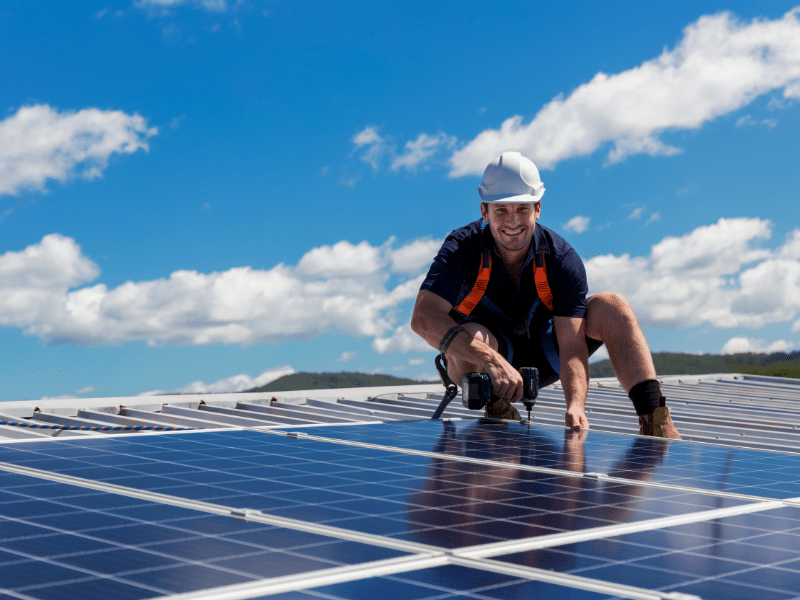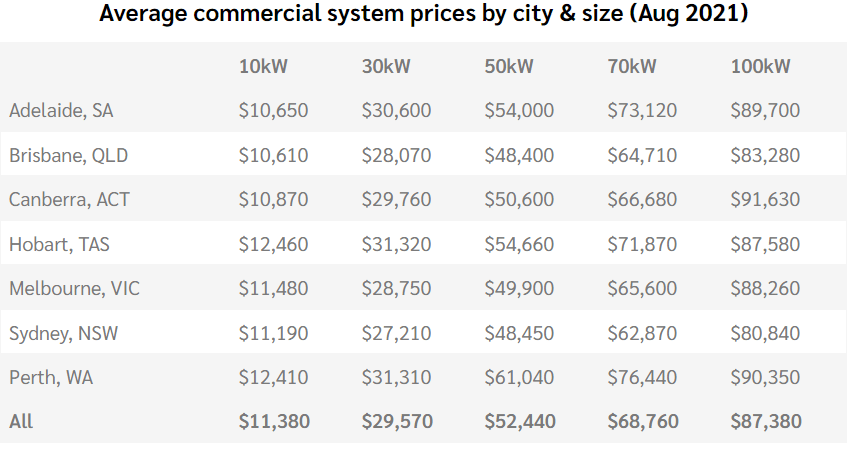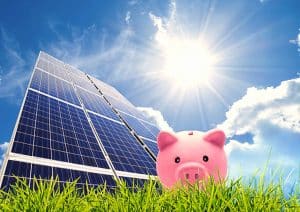Australian businesses looking to reduce their energy costs have likely wondered whether it’s worth investing in rooftop solar. In the last 10 years, power prices have doubled in Australia and are expected to increase by another 4% per annum over the next five years. Commercial solar, once considered an expensive alternative power source, has now become increasingly cost-effective and one of the safest investments of 2021. In fact, latest figures reveal Australian businesses currently utilising rooftop solar are saving up to 31% of their energy costs compared to businesses using the grid.

This post will discuss all you need know about commercial solar: what the benefits are, how much systems cost, what government rebates and incentives are available, and more.
Will my business benefit from a solar PV system?
Electricity is a significant operating cost for most businesses, many of which use the bulk of their power during daylight hours. This aligns perfectly with solar, as your business can use all the energy that is produced at the time of generation.
Installing solar PV panels on your roof will reduce the amount of power the business uses from the grid, which means lower energy bills. In most cases an investment in solar energy can generate quick payback and long-term savings. In fact, most businesses will recoup the cost of their solar investment in just a few short years. Businesses that use a lot of power and are heavily reliant on the grid will benefit most from solar panels.
For example: a small business consuming 50,000 kilowatt hours per annum that installs a 15 kW system can displace an average of 33% of its electricity usage.
Other benefits are that systems are easy to maintain and, if you own the business premises, installing panels can also increase your property’s resale value.
Lastly, going solar means you will be reducing your business’ carbon footprint. While your investment may be purely for financial reasons, many of your customers care deeply about creating a greener and cleaner world for future generations. Promoting your new environmentally-friendly status can help generate new business and referrals.
How much do commercial solar PV systems cost?
The cost of installing a commercial solar system can vary significantly and is influenced by a range of factors from where you live, the retailer or installer you choose, the warranties available, and the technology and size of your system.
The major factors which will affect the price of a solar system are:
- Current government rebates and incentives
- Installation costs
- Type and number of panels
- Type and size of inverter
- Type of framing equipment and other system components
- After sales service agreements
The table below provides an estimate on the average cost of commercial solar systems by city and size as of August 2021.

What rebates and incentives are available?
The main federal government incentives come in the form of Renewable Energy Certificates (RECs). There are two types of certificates issued:
- Small-scale Technology Certificates (STCs) – for solar panel systems ≤ 100kW
- Large-scale Generation Certificates (LGCs) – for solar panel systems > 100kW
Both STCs and LGCs are tradeable commodities attached to eligible installations of solar power systems. In a commercial size solar system, their value can be many thousands of dollars.
Many solar installers will provide you with a point of sale discount if you elect to sign over your STCs or LGCs to them. This saves you valuable time and hassle over attempting to trade the certificates yourself.
On a state government level, incentives can vary significantly.
Should you produce more energy than you consume with a commercial solar system, the excess electricity can be fed back into the grid in exchange for money. This is called a feed-in-tariff and the amount varies state by state.
As feed-in-tariffs have steadily declined in recent years, you are likely to receive the largest benefits from your solar system through ‘self-consumption’, so it is important that your installer matches your system size to your average consumption.
Some states offer their own commercial solar incentives. For instance, the Victorian State Government currently offers a Solar for Business rebate for small businesses. This initiative reduces the upfront cost of the installation of an approved small-scale solar PV system up to 30kW.
Aside from federal and state government rebates, there are many options that can assist you with the upfront cost of going solar. These include Power Purchase Agreements (PPA), operating leases and finance options. In many cases, your entire system is a write-off and no upfront funding is required.
What panels should I buy?
A good rule-of-thumb is to only purchase well-known brand name panels and inverters from companies that have a history operating in Australia.
For the fastest Return on Investment (ROI), high quality panels and premium inverter technology can deliver in as little as 2 years. Premium systems will save you more money over the longer term, due to higher output and a slower rate of degradation. With high-output panels, you can also achieve a larger system with limited roof space.
What’s involved in the installation process?
A typical commercial solar installation comprises of 6 key steps:
- Design and feasibility
- Product selection
- Quotation and agreement
- Applying for building approvals (if applicable)
- Installation / connecting to the grid
- Applying for government rebates / arranging feed-in-tariffs
Further information on this process can be found through the Clean Energy Council.
What if I don’t own my building? Are there any other options?
A common barrier to businesses installing solar PV systems is building ownership. As solar systems are long-term investments and involve making changes to the building, tenants can find it difficult to secure landlord permission and long-term finance arrangements. It may be worth exploring the option of arranging a solar panel agreement with your body corporate or landlord as part of your lease terms. This agreement could determine the responsibilities of both you and your landlord in installing and maintaining a solar PV system.
Where can I find a trustworthy installer?
You will want to partner with a trusted installer whose business holds the appropriate accreditations. A reputable and experienced installer—ideally one whose business has been operating at least five years, can provide sound advice and quality products that will best suit your business needs.
The verdict…
If you’re looking for a way to significantly reduce your business energy costs and achieve a ROI in just a few years, then investing in commercial solar panels is worth considering. Just remember that it’s important to find a trusted installer who knows how to properly size and install quality panels so your business can reap these benefits.
Energy Matters has done the hard work for you and vetted a network of trusted and qualified solar installers in Melbourne. Receive up to 3 free, obligation-free solar quotes—it will only takes a few minutes and you’ll be well on your way to reaping the rewards of a smart investment.






































